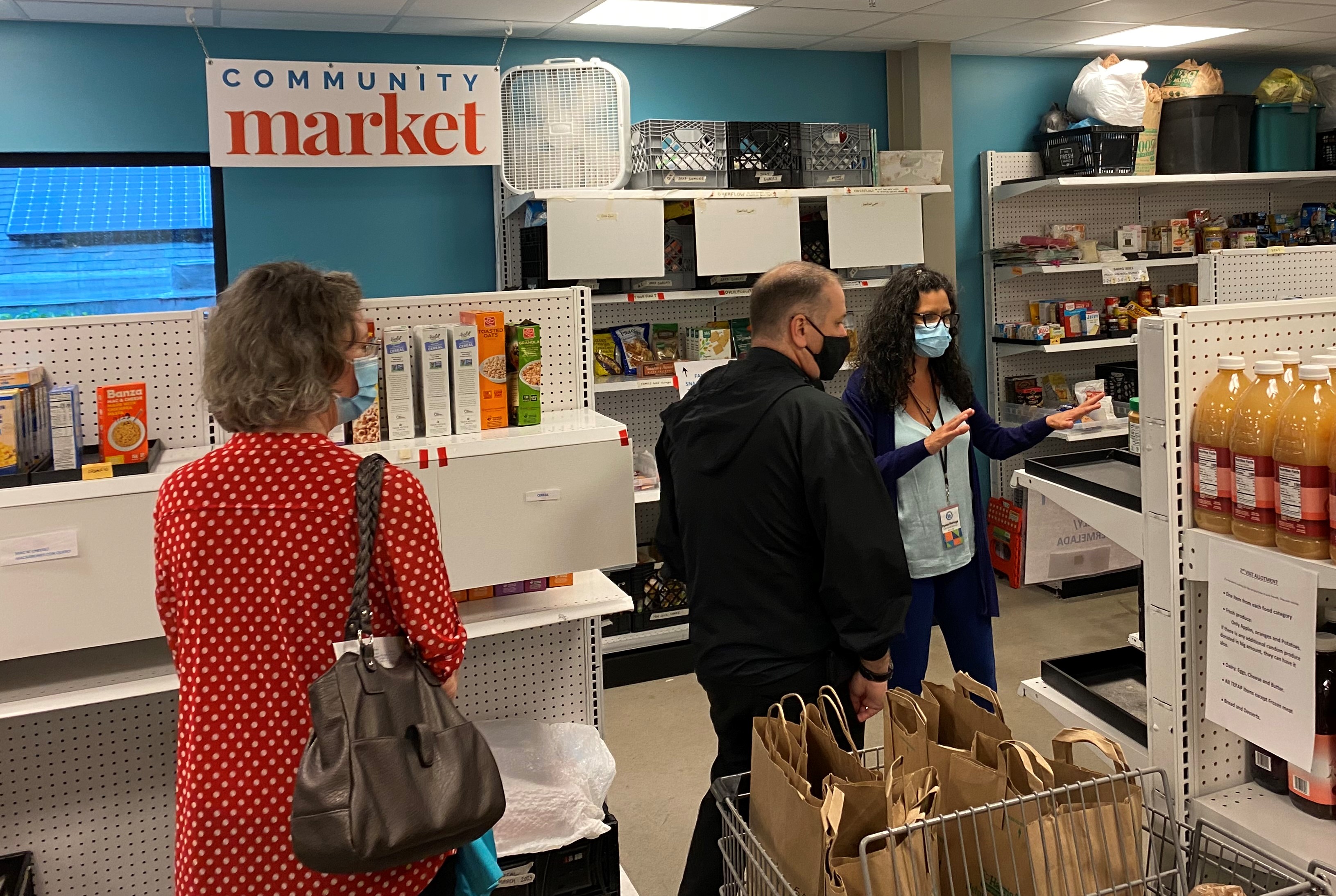Why Sustaining Your Local Food Cupboard Is Vital for Helping Those in Need
The importance of supporting regional food cupboards can not be overemphasized, specifically in the context of food instability, which affects a startling number of individuals and family members within our communities. These necessary resources not only give immediate alleviation from cravings but additionally add to wider social benefits, including boosted health and academic end results. As we explore the multifaceted role of food kitchens, it comes to be noticeable that their impact prolongs far beyond just dispersing food (Food Pantry Lockhart). Comprehending this much deeper connection may prompt a reconsideration of how we engage with and sustain these vital institutions.
Comprehending Food Insecurity
Food insecurity impacts around 10.5% of households in the United States, showing a considerable public health concern that goes beyond mere cravings. It describes the absence of regular accessibility to adequate food for an active, healthy and balanced life. This problem can result in a series of negative outcomes, consisting of inadequate wellness, enhanced healthcare expenses, and decreased scholastic performance amongst kids.
The root causes of food instability are multifaceted, usually originating from economic variables such as poverty, underemployment, and joblessness. Geographical location can additionally play a crucial role, with food deserts-- areas with minimal accessibility to nutritious and cost effective food-- aggravating the problem - Food Pantry Lockhart. In addition, systemic variables, including social and racial inequities, add to the out of proportion influence of food insecurity on marginalized communities
Attending to food instability is not just regarding raising food supply; it needs a thorough approach that incorporates financial stability, education, and community assistance. Food instability not just influences private health yet additionally has broader implications for social health and wellness and efficiency. Comprehending its complexity is necessary for creating efficient treatments and cultivating lasting options that guarantee all people have trusted accessibility to nourishing food.
The Role of Food Pantries
Neighborhood food cupboards offer as vital lifelines for people and family members facing food insecurity. They provide vital food things to those that may struggle to afford adequate nutrition because of economic difficulty, unemployment, or unanticipated conditions. By distributing food at no charge, these organizations assist minimize hunger and avoid the negative health influences related to inadequate diets.
Food cupboards usually companion with neighborhood ranches, supermarket, and community organizations to resource a range of nourishing food items, consisting of fresh produce, milk, and healthy proteins. This collaboration makes certain that kitchen clients obtain not only sustenance however likewise healthier alternatives that contribute to general well-being.
Additionally, food pantries work as area hubs, promoting connections among residents and giving a sense of self-respect to those in need. Many cupboards offer additional resources, such as nourishment education and learning and recommendations to social services, helping customers browse their difficulties a lot more successfully.
Basically, food pantries play a complex role in combating food insecurity. They not only address instant cravings however also equip people and households to enhance their scenarios, thereby promoting neighborhood durability and communication.

Benefits of Sustaining Food Pantries

Supporting food pantries not only nourishes those in demand however additionally reinforces the material of the community. By offering essential food sources, food pantries relieve cravings and decrease food instability, which is important for the health and wellness of families and individuals. Accessibility to nourishing food contributes to boosted physical health, much better educational results for kids, and boosted psychological health and wellness, consequently cultivating a much more effective and engaged neighborhood.
Furthermore, sustaining food kitchens promotes social cohesion. These organizations function as hubs for area interaction, uniting volunteers, benefactors, and recipients in a shared mission to deal with cravings. This cooperation can break down obstacles, foster understanding, and construct connections amongst varied community members.
In addition, contributions to food kitchens, whether in the type of food, funds, or time, stimulate the neighborhood economic situation. Lots of food cupboards focus on sourcing from regional manufacturers, thus supporting regional farming and companies. This creates a cycle of support that benefits not only those in need yet the community overall.
How to Get Included
Engagement with food pantries can take several types, enabling teams and individuals to make a purposeful influence in their areas. Among one of the most direct means to obtain included is by contributing food items. Non-perishable items such as canned goods, pasta, and rice are constantly sought after. Monetary donations view publisher site are also important, as they enable food cupboards to buy fresh produce and necessary supplies.
Volunteering your time is one more impactful method to support regional food pantries (Food Pantry Lockhart). In enhancement, think about arranging food drives within your school, neighborhood, or office team to increase recognition and gather resources.
Collaborations with regional businesses can better boost assistance for food pantries. By taking these steps, people and groups can significantly reinforce the efforts of neighborhood food kitchens and help those in need.
Area Impact and Link
Identifying the profound impact of food cupboards on community wellness is important for cultivating a spirit of connection and partnership. Food cupboards serve not just as important sources for those encountering food insecurity however likewise as centers for community interaction. They bring with each other varied teams-- donors, clients, and volunteers-- developing an atmosphere where individuals can link anchor and support each other.
The influence of food pantries prolongs beyond plain provision of food; they act as a catalyst for social communication. By taking part in kitchen efforts, area participants can create relationships that transcend socioeconomic barriers. This network of support helps to take apart the preconception commonly related to food support, promoting an atmosphere of approval and understanding.
As people unite in their efforts to sustain regional food kitchens, they grow a sense of shared purpose and duty, strengthening the concept that every person moved here has a role to play in making sure that no one goes hungry. Inevitably, supporting food cupboards strengthens the material of the area as a whole.
Conclusion
Supporting local food pantries is necessary in combating food instability and boosting the wellness of prone populaces. Interaction with food pantries cultivates area links, promoting social communication and equity.

 Anna Chlumsky Then & Now!
Anna Chlumsky Then & Now! Joseph Mazzello Then & Now!
Joseph Mazzello Then & Now! Daryl Hannah Then & Now!
Daryl Hannah Then & Now! McKayla Maroney Then & Now!
McKayla Maroney Then & Now! Ricky Schroder Then & Now!
Ricky Schroder Then & Now!